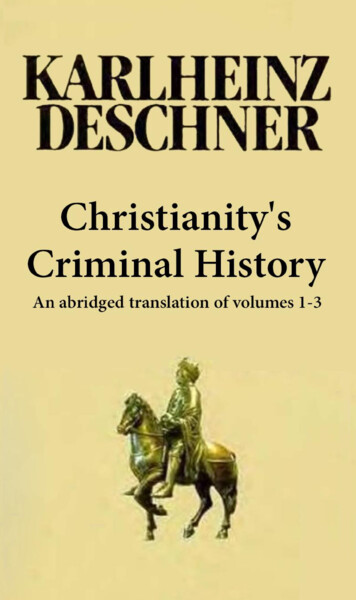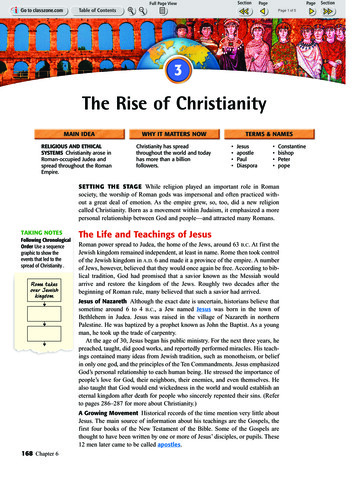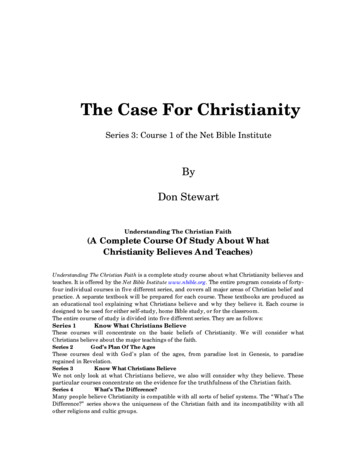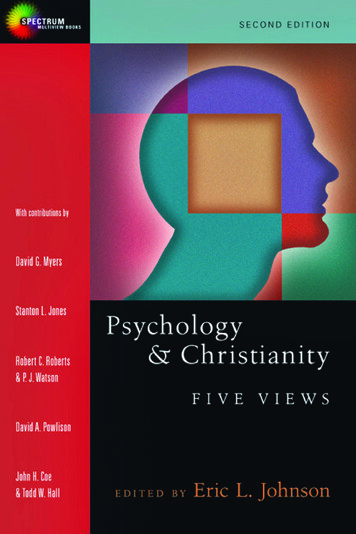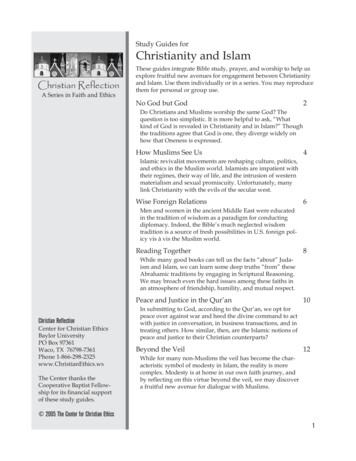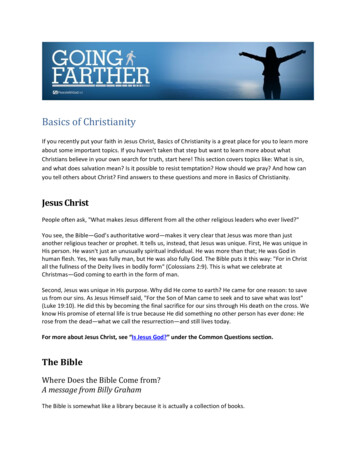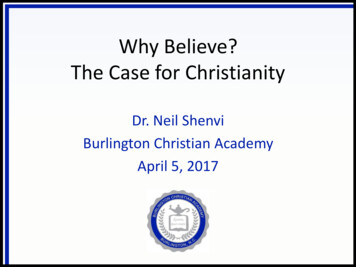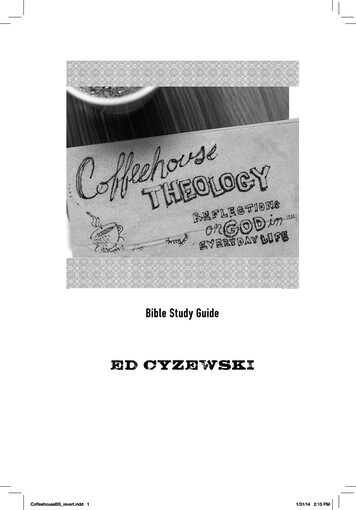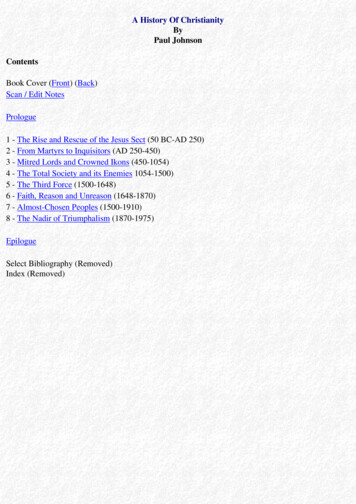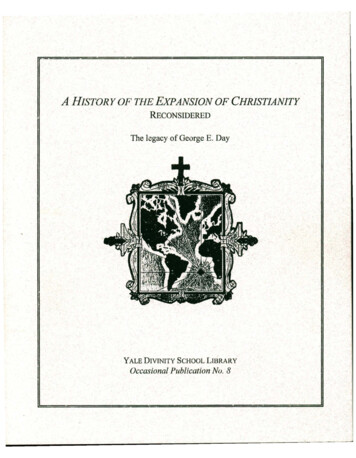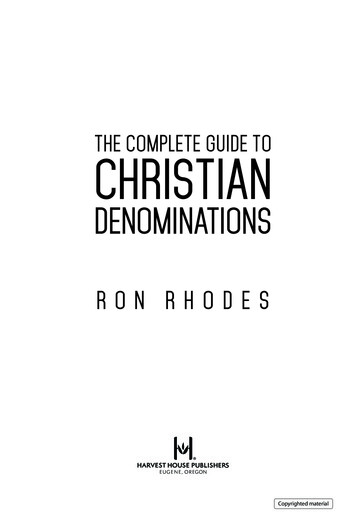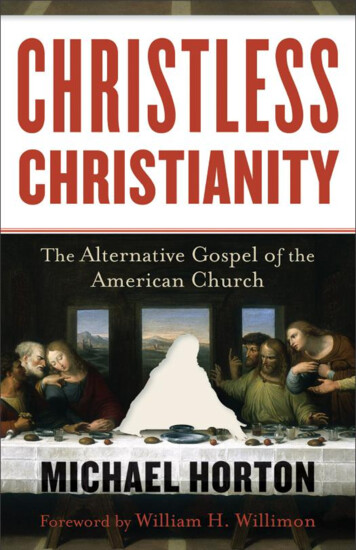
Transcription
ChristlessChristianityThe Alternative Gospel of theAmerican ChurchMichael HortonCMichael Horton, Christless ChristianityBaker Books, a division of Baker Publishing Group, 2008. Used by permission.Horton Christless MW bb.indd 37/17/08 2:12:31 PM
2008 by Michael HortonPublished by Baker Booksa division of Baker Publishing GroupP.O. Box 6287, Grand Rapids, MI 49516-6287www.bakerbooks.comPrinted in the United States of AmericaAll rights reserved. No part of this publication may be reproduced, stored in a retrievalsystem, or transmitted in any form or by any means—for example, electronic, photocopy,recording—without the prior written permission of the publisher. The only exceptionis brief quotations in printed reviews.Library of Congress Cataloging-in-Publication DataHorton, Michael Scott.Christless Christianity : the alternative gospel of the American church /Michael Horton.p. cm.Includes bibliographical references (p. ).ISBN 978-0-8010-1318-8 (cloth)1. Evangelicalism—United States. 2. United States—Religious life andcustoms. 3. Jesus Christ—History of doctrines—United States. I. Title.BR1642.U5H674 2008277.3 083—dc22 2008023631Unless otherwise indicated, Scripture is taken from The Holy Bible, English StandardVersion, copyright 2001 by Crossway Bibles, a division of Good News Publishers.Used by permission. All rights reserved.Scripture marked KJV is taken from the King James Version of the Bible.Scripture marked NASB is taken from the New American Standard Bible , Copyright 1960, 1962, 1963, 1968, 1971, 1972, 1973, 1975, 1977, 1995 by The Lockman Foundation. Used by permission.Scripture marked NIV is taken from the HOLY BIBLE, NEW INTERNATIONALVERSION . NIV . Copyright 1973, 1978, 1984 by International Bible Society. Usedby permission of Zondervan. All rights reserved.Scripture marked NKJV is taken from the New King James Version. Copyright 1982by Thomas Nelson, Inc. Used by permission. All rights reserved.Scripture marked NRSV is taken from the New Revised Standard Version of the Bible,copyright 1989, Division of Christian Education of the National Council of the Churchesof Christ in the United States of America. Used by permission. All rights reserved.Michael Horton, Christless ChristianityBaker Books, a division of Baker Publishing Group, 2008. Used by permission.Horton Christless MW bb.indd 47/17/08 2:12:31 PM
ContentsForeword: Liberating a Captive Church 9Acknowledgments 131. Christless Christianity: The American Captivity of theChurch 152. Naming Our Captivity: Moralistic, TherapeuticDeism 293. Smooth Talking and Christless Christianity 654. How We Turn Good News into Good Advice 1015. Your Own Personal Jesus 1596. Delivering Christ: The Message and the Medium 1897. A Call to the Resistance 237Notes 2617Michael Horton, Christless ChristianityBaker Books, a division of Baker Publishing Group, 2008. Used by permission.Horton Christless MW bb.indd 77/17/08 2:12:31 PM
ForewordLiberating a Captive ChurchHere we are in the North American church—conservative or liberal, evangelical or mainline, Protestant orCatholic, emergent or otherwise—cranking along justfine, thank you. So we’re busy downsizing, becoming culturallyrelevant, reaching out, drawing in, making disciples, managingthe machinery, utilizing biblical principles, celebrating recovery,user-friendly, techno savvy, finding the purposeful life, practicing peace with justice, utilizing spiritual disciplines, growingin self-esteem, reinventing ourselves as effective ecclesiasticalentrepreneurs, and, in general, feeling ever so much better aboutour achievements.Notice anything missing in this pretty picture? Jesus Christ!Jesus Christ indeed. In Flannery O’Connor’s wild, wickedlyfunny novella, Wise Blood, her antipreacher preacher, HazelMotes, preaches a “Church without Christ” where nobody shedsblood, and there’s no redemption “’cause there ain’t no sin to9Michael Horton, Christless ChristianityBaker Books, a division of Baker Publishing Group, 2008. Used by permission.Horton Christless MW bb.indd 97/17/08 2:12:31 PM
Forewordredeem,” and “what’s dead stays that way.”1 I always thoughtO’Connor’s book an outrageous, wildly improbable satire. ThenMike Horton comes along and names the “Church withoutChrist” as our pervasive ecclesial reality. Horton accuses us ofachieving what has never transpired in the entire history of Christendom. Somehow we’ve managed to preach Christ crucified insuch a way that few are offended, a once unmanageable Godsuddenly seems nice, and the gospel makes good sense—as weare accustomed to making sense. We just can’t stand to submitto the machinations of a living God who is determined to haveus on God’s terms rather than ours, so we devise a god on ourown terms. Flaccid, contemporary Christianity is the result.This is a tough book, but well written, fast paced, and wonderfully grounded in classical Reformation Christianity. Our poorold, compromised, accommodating church is here subjected towithering theological critique. Here the roots of our currenttheological malaise are exposed and we see the wrong turnswe took when we began taking ourselves more seriously thanGod. The boredom and conventionality of the contemporarychurch are assaulted. Michael Horton diagnoses our trouble instunning, unavoidable candor. Therapeutic, utilitarian deism isnamed, nailed, and and defeated with the best weapon God hasgiven us—the gospel of Jesus Christ. Presumptively evangelical Christianity is exposed as the latest recruit to the cause ofinsipid, culturally compromised liberalism. I am judged in theprocess. Robert Schuller’s vapid ecclesiology is us all over. Mysermons are only slightly less silly and compromised than JoelOsteen’s. Mea culpa. Mea culpa. Mea culpa.But this book is not all critique. Horton mounts a wonderfully hopeful argument. His sermon is not only tough but alsoinvigorating and empowering. In the process of reading thisJesus-induced polemic, you will be recalled to the power ofthe gospel. God forgive us for selling out our great intellectual10Michael Horton, Christless ChristianityBaker Books, a division of Baker Publishing Group, 2008. Used by permission.Horton Christless MW bb.indd 107/17/08 2:12:31 PM
Forewordtreasure—the gospel of God with us—for a mess of psychobabbleand pragmatic, utilitarian, self-help triviality.Horton joyfully reminds us that theological thinking is somuch more interesting than all of the distractions that keep usbusy but malnourished. The peculiar Good News of Jesus Christis better than anything William James or Charles G. Finney andtheir innumerable heirs have to offer. The determination of Godin Jesus Christ to love sinners and to enlist them in the invasionthat is his kingdom is so much more relevant to our true condition than our inclination to meet the felt needs of narcissisticNorth American consumers.Have a wonderful adventure reading this book. Enjoy beingenticed into the strange new world of vibrant Christianity inHorton’s spirited gospel recovery operation. In the process, youwill be liberated from our cultural captivity so that again youwill be free to worship, in word and deed, the risen Christ.Let’s put Christ back in Christianity.William WillimonBishop of the United Methodist ChurchBirmingham, Alabama11Michael Horton, Christless ChristianityBaker Books, a division of Baker Publishing Group, 2008. Used by permission.Horton Christless MW bb.indd 117/17/08 2:12:31 PM
AcknowledgmentsAlthough I have debts to many for this book, especiallyto those who have provided wonderful examples offaithfulness to the gospel over many years, I will limitacknowledgments here to the Baker team, including Bob Hosackand Mary Wenger, but especially to Jack Kuhatschek, whoseencouragement and patient direction on this project proved invaluable. Finally, I am grateful to my Westminster SeminaryCalifornia colleagues and students, to the White Horse Inn/Modern Reformation staff, and Christ United Reformed Church,but especially to my wife, Lisa, and our children, James, Olivia,Matthew, and Adam, for always being a reminder to me of whythese issues are so important.13Michael Horton, Christless ChristianityBaker Books, a division of Baker Publishing Group, 2008. Used by permission.Horton Christless MW bb.indd 137/17/08 2:12:31 PM
Michael Horton, Christless ChristianityBaker Books, a division of Baker Publishing Group, 2008. Used by permission.Horton Christless MW bb.indd 147/17/08 2:12:31 PM
1Christless ChristianityThe American Captivity of the ChurchWhat would things look like if Satan really took controlof a city? Over a half century ago, Presbyterian minister Donald Grey Barnhouse offered his own scenarioin his weekly sermon that was also broadcast nationwide on CBSradio. Barnhouse speculated that if Satan took over Philadelphia,all of the bars would be closed, pornography banished, andpristine streets would be filled with tidy pedestrians who smiledat each other. There would be no swearing. The children wouldsay, “Yes, sir” and “No, ma’am,” and the churches would be fullevery Sunday . . . where Christ is not preached.It is easy to become distracted from Christ as the only hope forsinners. Where everything is measured by our happiness ratherthan by God’s holiness, the sense of our being sinners becomessecondary, if not offensive. If we are good people who have lostour way but with the proper instructions and motivation can15Michael Horton, Christless ChristianityBaker Books, a division of Baker Publishing Group, 2008. Used by permission.Horton Christless MW bb.indd 157/17/08 2:12:31 PM
Christless Christianitybecome a better person, we need only a life coach, not a redeemer.We can still give our assent to a high view of Christ and the centrality of his person and work, but in actual practice we are beingdistracted from “looking to Jesus, the founder and perfecter ofour faith” (Heb. 12:2). A lot of the things that distract us fromChrist these days are even good things. In order to push us offpoint, all that Satan has to do is throw several spiritual fads,moral and political crusades, and other “relevance” operationsinto our field of vision. Focusing the conversation on us—ourdesires, needs, feelings, experience, activity, and aspirations—energizes us. At last, now we’re talking about something practicaland relevant.As provocative as Barnhouse’s illustration remains, it issimply an elaboration of a point made throughout the history of redemption. Wherever Christ is truly and clearly beingproclaimed, Satan is most actively present in opposition. Thewars between the nations and enmity within families and neighborhoods is but the wake of the serpent’s tail as he seeks todevour the church. Yet even in this pursuit, he is more subtlethan we imagine. He lulls us to sleep as we trim our messageto the banality of popular culture and invoke Christ’s namefor anything and everything but salvation from the comingjudgment. While undoubtedly stirring his earthly disciples topersecute and kill followers of Christ (with more martyrdomsworldwide in an average year now than in any previous era),Satan knows from experience that sowing heresy and schismis far more effective. While the blood of the martyrs is theseed of the church, the assimilation of the church to the worldsilences the witness.I think that the church in America today is so obsessed withbeing practical, relevant, helpful, successful, and perhaps evenwell-liked that it nearly mirrors the world itself. Aside fromthe packaging, there is nothing that cannot be found in most16Michael Horton, Christless ChristianityBaker Books, a division of Baker Publishing Group, 2008. Used by permission.Horton Christless MW bb.indd 167/17/08 2:12:32 PM
Christless Christianitychurches today that could not be satisfied by any number ofsecular programs and self-help groups.Christless Christianity. Sounds a bit harsh, doesn’t it? A littleshallow, sometimes distracted, even a little human-centeredrather than Christ-centered from time to time, but Christless?Let me be a little more precise about what I am assuming to bethe regular diet in many churches across America today: “domore, try harder.” I think that this is the pervasive messageacross the spectrum today. It can be exhibited in an older, moreconservative form, with a recurring emphasis on moral absolutes and warnings about falling into the pit of worldliness thatcan often make one wonder whether we are saved through fearrather than faith. Heaven and hell still figure prominently inthis version. Especially on the “high holy days” of the Americanchurch calendar (that is, Memorial Day, Independence Day,Father’s Day, and Mother’s Day), often complete with giantAmerican flags, a color guard, and patriotic songs, this sternerversion of “do more, try harder” helped get the culture warsoff the ground. At the same time, more liberal bodies could bejust as shrill with their “do more, try harder” list on the leftand their weekly calls to action rather than clear proclamation of Christ.Reacting against this extreme version of fundamentalist andliberal judgmentalism, another generation arose that wanted tosoft-pedal the rigor, but the “do more, try harder” message hasstill dominated—this time in the softer pastels of Al Franken’s“Stuart Smalley” than in the censorious tone of Dana Carvey’s“Church Lady,” both of Saturday Night Live fame. In this version, God isn’t upset if you fail to pull it off. The stakes aren’t ashigh: success or failure in this life, not heaven or hell. No longercommands, the content of these sermons, songs, and best-sellingbooks are helpful suggestions. If you can’t get people to be betterwith sticks, use carrots.17Michael Horton, Christless ChristianityBaker Books, a division of Baker Publishing Group, 2008. Used by permission.Horton Christless MW bb.indd 177/17/08 2:12:32 PM
Christless ChristianityIncreasingly, a younger generation is taking leadership thatwas raised on hype and hypocrisy and is weary of the narcissistic (i.e., “me-centered”) orientation of their parents’ generation. They are attracted to visions of salvation larger than thelegalistic individualism of salvation-as-fire-insurance. Yet theyare also fed up with the consumeristic individualism of salvationas-personal-improvement. Instead, they are desperately craving authenticity and genuine transformation that produces truecommunity, exhibiting loving acts that address the wider socialand global crises of our day rather than the narrow jeremiadsof yesteryear.Despite significant differences across these generations andtypes of church ministry, crucial similarities remain. The focusstill seems to be on us and our activity rather than on God andhis work in Jesus Christ. In all of these approaches, there is thetendency to make God a supporting character in our own lifemovie rather than to be rewritten as new characters in God’sdrama of redemption. Assimilating the disruptive, surprising,and disorienting power of the gospel to the felt needs, moralcrises, and socio-political headlines of our passing age, we endup saying very little that the world could not hear from Dr. Phil,Dr. Laura, or Oprah.Besides the preaching, our practices reveal that we are focusedon ourselves and our activity more than on God and his savingwork among us. Across the board, from conservative to liberal,Roman Catholic to Anabaptist, New Age to Southern Baptist,the “search for the sacred” in America is largely oriented to whathappens inside of us, in our own personal experience, ratherthan in what God has done for us in history. Even baptism andthe Supper are described as “means of commitment” rather than“means of grace” in a host of contemporary systematic theologies by conservative as well as progressive evangelicals. Ratherthan letting “the word of Christ dwell in you richly, teaching18Michael Horton, Christless ChristianityBaker Books, a division of Baker Publishing Group, 2008. Used by permission.Horton Christless MW bb.indd 187/17/08 2:12:32 PM
Christless Christianityand admonishing one another in all wisdom, singing psalms andhymns and spiritual songs, with thankfulness in your hearts toGod” (Col. 3:16), the purpose of singing (the “worship time”)seems today more focused on our opportunity to express ourown individual piety, experience, and commitment. We come tochurch, it seems, less to be transformed by the Good News thanto celebrate our own transformation and to receive fresh marching orders for transforming ourselves and our world. Rather thanbeing swept into God’s new world, we come to church to find outhow we can make God relevant to the “real world” that the NewTestament identifies as the one that is actually fading away.Most Americans believe in God, affirm that Jesus Christ isin some sense divine, and believe that the Bible is the Wordof God. Evangelical pollster George Barna found that 86 percent of American adults describe their religious orientation asChristian, while only 6 percent describe themselves as atheistor agnostic.1 Judging by its commercial, political, and mediasuccess, the evangelical movement seems to be booming. But isit still Christian?I am not asking that question glibly or simply to provoke areaction. My concern is that we are getting dangerously closeto the place in everyday American church life where the Bible ismined for “relevant” quotes but is largely irrelevant on its ownterms; God is used as a personal resource rather than known,worshiped, and trusted; Jesus Christ is a coach with a goodgame plan for our victory rather than a Savior who has alreadyachieved it for us; salvation is more a matter of having our bestlife now than being saved from God’s judgment by God himself;and the Holy Spirit is an electrical outlet we can plug into forthe power we need to be all that we can be.As this new gospel becomes more obviously American thanChristian, we all have to take a step back and ask ourselveswhether evangelicalism is increasingly a cultural and political19Michael Horton, Christless ChristianityBaker Books, a division of Baker Publishing Group, 2008. Used by permission.Horton Christless MW bb.indd 197/17/08 2:12:32 PM
Christless Christianitymovement with a sentimental attachment to the image of Jesusmore than a witness to “Jesus Christ and him crucified” (1 Cor.2:2). We have not shown in recent decades that we have muchstomach for this message that the apostle Paul called “a stoneof stumbling, and a rock of offense,” “folly to Gentiles” (Rom.9:33; 1 Cor. 1:23). Far from clashing with the culture of consumerism, American religion appears to be not only at peace withour narcissism but gives it a spiritual legitimacy.Before I launch this protest, I should carefully state up frontwhat I am not saying. First, I acknowledge that there are manychurches, pastors, missionaries, evangelists, and distinguishedChristian laypeople around the world proclaiming Christ andfulfilling their vocations with integrity. I apologize in advance fornot telling this other side of the story, with its truly remarkableexceptions. However, I doubt that they will mind, since manyof them register similar worries about the state of Christianityin America.Second, I am not arguing in this book that we have arrived atChristless Christianity but that we are well on our way. Thereneed not be explicit abandonment of any key Christian teaching,just a series of subtle distortions and not-so-subtle distractions.Even good things can cause us to look away from Christ and totake the gospel for granted as something we needed for conversion but which now can be safely assumed and put in the background. Center stage, however, is someone or something else.I will refer to recent studies demonstrating that it does notreally matter any longer whether one has been raised in an evangelical family and church—understanding the basic plot of thebiblical drama and its lead character is as unlikely for churchedas for unchurched young people. God and Jesus are still important, but more as part of the supporting cast in our ownshow. More interested in our own thin plots, we are losing ourconfidence in what English playwright Dorothy Sayers called20Michael Horton, Christless ChristianityBaker Books, a division of Baker Publishing Group, 2008. Used by permission.Horton Christless MW bb.indd 207/17/08 2:12:32 PM
Christless Christianity“the greatest story ever told.” So much of what I am calling“Christless Christianity” is not profound enough to constituteheresy. Like the easy-listening Muzak that plays ubiquitouslyin the background in other shopping venues, the message ofAmerican Christianity has simply become trivial, sentimental,affirming, and irrelevant.Third, I am not questioning American Christianity at thelevel of zeal. The call of Christian leaders to “deeds, not creeds”is doubtless motivated by a serious concern to be witnesses toChrist in a broken world. I do not question the sincerity ofthose who say that we have the correct doctrine but are not living it out. Rather, I simply do not agree with their assessment.I think our doctrine has been forgotten, assumed, ignored, andeven misshaped and distorted by the habits and rituals of dailylife in a narcissistic culture. We are assimilating the disruptingand disorienting news from heaven to the banality of our ownimmediate felt needs, which interpret God as a personal shopper for the props of our life movie: happiness as entertainment,salvation as therapeutic well-being, and mission as pragmaticsuccess measured solely in terms of numbers.So, in my view, we are living out our creed, but that creed iscloser to the American Dream than it is to the Christian faith.The claim I am laying out in this book is that the most dominant form of Christianity today reflects “a zeal for God” that isnevertheless without knowledge—particularly, as Paul himselfspecifies, the knowledge of God’s justification of the wicked bygrace alone, through faith alone, in Christ alone, apart fromworks (Rom. 10:2, see vv. 1–15).Fourth, there are a lot of issues I would like to address aboutour American captivity that will not be taken up here. Most ofthese issues I have treated elsewhere, especially in Made in America, Power Religion, and Beyond Culture Wars.2 The idols thatidentify the Christian cause with left-wing or right-wing political21Michael Horton, Christless ChristianityBaker Books, a division of Baker Publishing Group, 2008. Used by permission.Horton Christless MW bb.indd 217/17/08 2:12:32 PM
Christless Christianityideology are merely symptoms that Christ is not being regardedas sufficient for the church’s faith and practice today. As the mediafollows the growing shift among many younger evangelicals frommore conservative to more progressive politics, the real headlineshould be that the movement is going back to church to grow inthe grace and knowledge of Jesus Christ rather than becoming ademographic block in the culture wars. So my focus in this bookis on whether Christ is even being widely proclaimed in the nationwhere half the population claims to be evangelical.Where the gospel is not taken for granted, it is often a meansto an end, like personal or social transformation, love and serviceto our neighbors, and other things that in themselves are marvelous effects of the gospel. However, the Good News concerningChrist is not a stepping-stone to something greater and morerelevant. Whether we realize it or not, there is nothing in theuniverse more relevant to us as guilty image-bearers of God thanthe news that he has found a way to be “just and the justifier ofthe one who has faith in Jesus” (Rom. 3:26). It is “the power ofGod for salvation” (Rom. 1:16), not only for the beginning, butfor the middle and end as well—the only thing that creates thekind of new world to which our new obedience corresponds asa reasonable response.In the following chapters I offer statistics supporting the remarkable conclusion that those who are raised in “Bible-believing” churches know as little of the Bible’s actual content as theirunchurched neighbors. Christ is ubiquitous in this subculture,but more as an adjective (Christian) than as a proper name.While we swim in a sea of “Christian” things, Christ is increasingly reduced to a mascot or symbol of a subculture and theindustries that feed it. Just as you don’t really need Jesus Christin order to have T-shirts and coffee mugs, it is unclear to me whyhe is necessary for most of the things I hear a lot of pastors andChristians talking about in church these days.22Michael Horton, Christless ChristianityBaker Books, a division of Baker Publishing Group, 2008. Used by permission.Horton Christless MW bb.indd 227/17/08 2:12:32 PM
Christless ChristianityI do not think we realize the extent of our schizophrenia: annually decrying the commercialization of Christmas by the culturewhile we assume a consumer-product-sales approach in our ownchurches every week. We lament the growing secularization ofAmerican society while we ensure that the generations currentlyunder our care will know even less than their parents and beless shaped by the covenantal nurture that sustains life in Christover generations. While calling our capitulation to a narcissisticculture mission and relevance, we charge secularists with emptying public discourse of beliefs and values that transcend ourinstant gratification.While we take Christ’s name in vain for our own causes andpositions, trivializing his Word in all sorts of ways, we expressoutrage when a movie trivializes Christ or depicts Christians in anegative light. Although professing Christians are in the majority, we often like to pretend we are a persecuted flock being prepared for an imminent slaughter through the combined energiesof Hollywood and the Democratic Party. But if we ever were reallypersecuted, would it be because of our offensive posturing andself-righteousness or because we would not weaken the offenseof the cross? In my experience, substantiated by countless storiesof others, believers who challenge the human-centered process oftrivializing the faith are more likely to be persecuted—or at leastviewed as troublesome—by their church. My concern is not thatGod is treated so lightly in American culture but that he is nottaken seriously in our own faith and practice.Killing Us SoftlyMy argument in this book is not that evangelicalism is becomingtheologically liberal but that it is becoming theologically vacuous. Far from engendering a smug complacency, core evangelical23Michael Horton, Christless ChristianityBaker Books, a division of Baker Publishing Group, 2008. Used by permission.Horton Christless MW bb.indd 237/17/08 2:12:32 PM
Christless Christianityconvictions—centering on “Christ and him crucified”—drovethree centuries of evangelical missions. The ministry of JohnStott, a key leader of this postwar consensus, has embodiedthis integration of Christ-centered proclamation with missionalpassion. Yet when asked in a recent issue of Christianity Todayhow he evaluates this worldwide movement, Stott could onlyreply, “The answer is ‘growth without depth.’”3There certainly are signs that the movement’s theologicalboundaries are widening—and I will touch on a few examplesin this book. Furthermore, vacuity and liberalism have typically gone hand-in-hand when it comes to the church’s faithand practice. Liberalism started off by downplaying doctrine infavor of moralism and inner experience, losing Christ by degrees.Nevertheless, it is not heresy as much as silliness that is killingus softly. God is not denied but trivialized—used for our lifeprograms rather than received, worshiped, and enjoyed.Christ is a source of empowerment, but is he widely regardedamong us today as the source of redemption for the powerless?He helps the morally sensitive to become better, but does he savethe ungodly—including Christians? He heals broken lives, butdoes he raise those who are “dead in trespasses and sins” (Eph.2:1 NKJV)? Does Christ come merely to improve our existencein Adam or to end it, sweeping us into his new creation? IsChristianity all about spiritual and moral makeovers or aboutdeath and resurrection—radical judgment and radical grace? Isthe Word of God a resource for what we have already decidedwe want and need, or is it God’s living and active criticism ofour religion, morality, and pious experience? In other words, isthe Bible God’s story, centering on Christ’s redeeming work,that rewrites our stories, or is it something we use to make ourstories a little more exciting and interesting?Conservatives and liberals moralize, minimize, and trivializeChrist in different ways, of course, with different political and24Michael Horton, Christless ChristianityBaker Books, a division of Baker Publishing Group, 2008. Used by permission.Horton Christless MW bb.indd 247/17/08 2:12:32 PM
Christless Christianitysocial agendas, showing their allegiance either to elite culture orpopular culture, but it is still moralism. According to Methodistbishop William Willimon,Lacking confidence in the power of our story to effect that ofwhich it speaks, to evoke a new people out of nothing, our communication loses its nerve. Nothing is said that could not beheard elsewhere. . . . In conservative contexts, gospel speechis traded for dogmatic assertion and moralism, for self-helppsychologies and narcotic mantras. In more liberal speech, talktiptoes around the outrage of Christian discourse and ends upas an innocuous, though urbane, affirmation of the ruling order.Unable to preach Christ and him crucified, we preach humanityand it improved.4Liberals may have pioneered the theory that there is salvationin other names than Jesus Christ, but no group in modern historyhas wanted the general public to pray nonsectarian prayers—thatis, with or without Jesus Christ—as much as the conservativeevangelicals. When it comes to getting God back into our sc
Christless Christianity : the alternative gospel of the American church / Michael Horton. p. cm. Includes bibliographical references (p. ). ISBN 978-0-8010-1318-8 (cloth) 1. Evangelicalism—United States. 2. United States—Religious life and customs. 3. Jesus Christ—History
